 Petzlover
Petzlover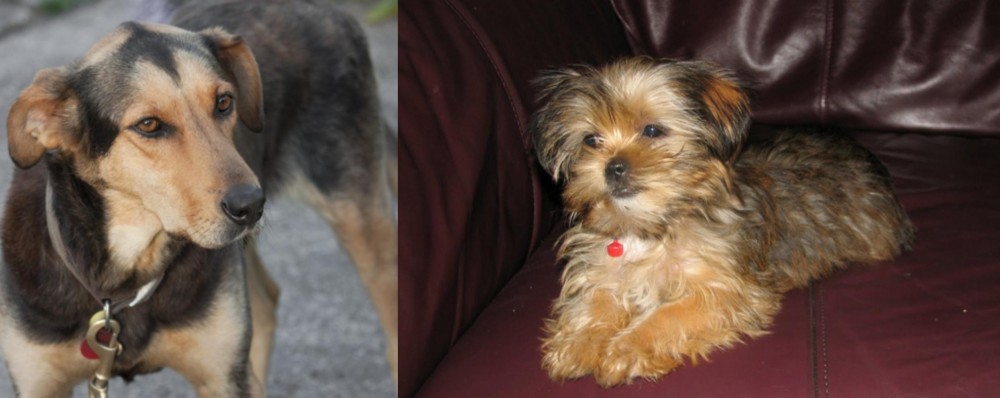 Huntaway is originated from New Zealand but Shorkie is originated from United States. Huntaway may grow 42 cm / 17 inches higher than Shorkie. Huntaway may weigh 39 kg / 86 pounds more than Shorkie. Both Huntaway and Shorkie has almost same life span. Both Huntaway and Shorkie has almost same litter size. Huntaway requires Low Maintenance. But Shorkie requires Moderate Maintenance
Huntaway is originated from New Zealand but Shorkie is originated from United States. Huntaway may grow 42 cm / 17 inches higher than Shorkie. Huntaway may weigh 39 kg / 86 pounds more than Shorkie. Both Huntaway and Shorkie has almost same life span. Both Huntaway and Shorkie has almost same litter size. Huntaway requires Low Maintenance. But Shorkie requires Moderate Maintenance
 The Huntaway or New Zealand Huntaway is a herding dog that originated in the New Zealand sheep country. Their main purpose is to drive sheep and they are not an old breed. They were developed late in the 19th century for their working skills. The only real criteria was that they were black and tan. A dog must win a trial in order to be placed in the New Zealand Sheep Dog Trial Association studbook. They drive sheep mainly through their deep, loud voice.
The Huntaway or New Zealand Huntaway is a herding dog that originated in the New Zealand sheep country. Their main purpose is to drive sheep and they are not an old breed. They were developed late in the 19th century for their working skills. The only real criteria was that they were black and tan. A dog must win a trial in order to be placed in the New Zealand Sheep Dog Trial Association studbook. They drive sheep mainly through their deep, loud voice.
In the New Zealand high country there was a need for a working dog with stamina, agility and intelligence to work the sheep as a drover (herder). The dog had to be able to handle rough, steep land and work with very large groups of sheep. The sheer area of land that the sheep graze and the dog would have to cover, demanded that this dog have stamina and strength to cover large pasture land and work for days if necessary. Before this the shepherds had used British sheepdogs but they preferred dogs that barked while working. So they bred the British Sheepdogs with Collies, Border Collies, Labrador, Rottweiler, Doberman and other barking sheepdogs to create the Huntaway. In addition to the bark, they bred for stamina and size.
They were participating in field trails in 1870 and ads for them were seen in newspapers by 1884. They became a separate breed in the 20th century. Today they are spreading around the world and are becoming very popular. It is not recommended that they be kept as pets however, since they are true working dogs.
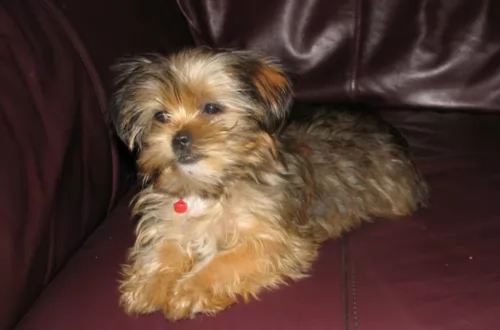 The Shorkie is a mix between a Yorkshire Terrier and a Shih Tzu. This little dog actually thinks he’s quite big. He is a great watchdog and a barker, and he is a loyal and loving member of his family. He will let you know if he thinks something is going on that shouldn’t be.
The Shorkie is a mix between a Yorkshire Terrier and a Shih Tzu. This little dog actually thinks he’s quite big. He is a great watchdog and a barker, and he is a loyal and loving member of his family. He will let you know if he thinks something is going on that shouldn’t be.
This hybrid combines two breeds known for their good looks, cuteness and personalities. Shorkies get their watchdog instincts and their loyalty to their people from the Shih Tzu and their personalities and good looks from the Yorkie. This designer breed has no known standard and every puppy is different, but traits from its founding breeds will remain. Both breeds have great personalities.
Regardless of the differences within the litter, because the personalities and adorableness of the two founding breeds are equal, all of the puppies will have those characteristics. They will all be energetic, playful and think they are big dogs. They will all love people and especially kids – playing and watching over them.
The Shorkie is intelligent, trainable, and snuggly. They will also have the stubborn trait that the two founding breeds can show at times. Developed in the United States, this crossbreed is extremely popular even though they have been in existence for only ten years or so. Breeders in the U.S. began to mix these two breeds in order to develop a cute, friendly and intelligent little dog that will cuddle on your lap – perfect lap dog.
Even if we already have breeds similar to the Shorkie, its development allows breeders to diversify and improve the genetics of the dogs. It is important that these be responsible breeders whose intentions are not financial but to legitimately improve the positive traits of each breed while sorting out the undesirable or weak traits. This is the positive side of the new designer breeds.
Even though it is still being developed, at least the Shorkie seems to be a success story for designer breeds as a loving, popular little dog. It will take a lot more time and a lot more development before the Shorkie becomes an actual recognized breed. At the moment it remains a hybrid, a crossbreed, a so called designer dog.
It will be at least 7-10 generations of careful and quality breeding before the Shorkies are potentially recognized as its own pedigree breed. It is important to breed Shorkies to Shorkies in order to develop a standard that could be accepted for a new breed by the AKC and UKC. Over time the puppies must become more and more standardized in their conformity to that new breed standard. Their physical appearance and their temperament will be standardized. At this stage the second generation of Shorkies is rare. Their popularity is rising in the United Kingdom. Both Britain and Ireland have a growing interest in this hybrid.
 The Huntaway is a large dog with a deep chest and a black and tan coat. They are strong, big and muscular with voices to match. They herd, head, work the sheep in pastures and force them into pens. They are bred to have that big authoritative, deep bark. They do not yap. Their bodies are well proportioned but longer than high. They have well - padded feet and a deep chest for stamina, along with strong legs and body that allows them to run fast and change directions at will.
The Huntaway is a large dog with a deep chest and a black and tan coat. They are strong, big and muscular with voices to match. They herd, head, work the sheep in pastures and force them into pens. They are bred to have that big authoritative, deep bark. They do not yap. Their bodies are well proportioned but longer than high. They have well - padded feet and a deep chest for stamina, along with strong legs and body that allows them to run fast and change directions at will.
The tail of a Huntaway if long, while their heads are shaped like blocks while the muzzle is long and the nose is black. They have dark, round eyes and long ears. An unusually attractive dog, they have dense fur with fringe on the tail and chest. There is characteristics a very large variety in the in the way the breed looks from one dog to the next. Thus they do not participate in confirmation events, as the standard is based on working characteristics rather than appearance guidelines. They are more a “class” than a “breed”.
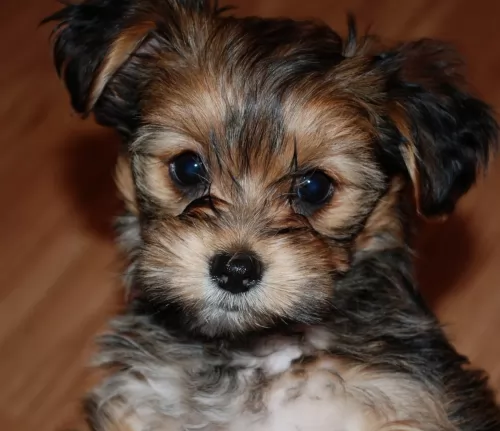 The Shorkie, being a cross between the Yorkshire Terrier and the Shih Tzu, and as such has physical and temperament characteristics from both breeds. They could be 50-50 but most likely each puppy will be more like one of the founding parents than the other. Because there is a lot of similarity between the founding breeds there is a lot of similarity between the Shorkies.
The Shorkie, being a cross between the Yorkshire Terrier and the Shih Tzu, and as such has physical and temperament characteristics from both breeds. They could be 50-50 but most likely each puppy will be more like one of the founding parents than the other. Because there is a lot of similarity between the founding breeds there is a lot of similarity between the Shorkies.
Their hair is either wavy or straight, but it is soft. It can be a wide variety of colors and usually they have a darker mask on the face. Usually they have the eyes of the Shih Tzu – large -but not protruding. Their muzzle is short, and the skull is round with triangle ears. Their bodies are compact, small with plenty of muscle for their size. They also have fine bones and short legs, with a thin curled tail.
 The Huntaway is a pretty healthy breed, developed as it was from the sheepdogs and collies. They still face some inherited issues such as:
The Huntaway is a pretty healthy breed, developed as it was from the sheepdogs and collies. They still face some inherited issues such as:
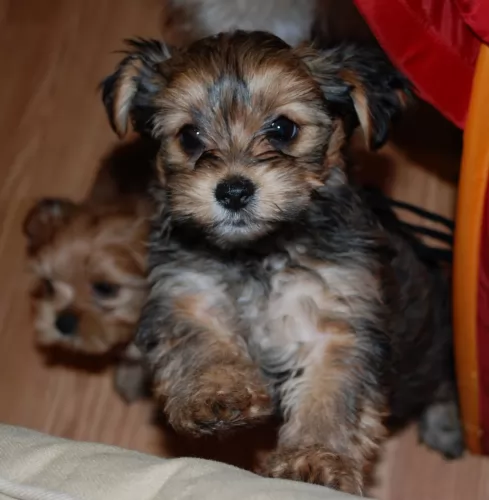 Many hybrids are in better health at least genetically than their parent breeds. Responsible breeders will breed any genetic issues out of their puppies. Still there are many health issues that the Shorkies are prone to. These include:
Many hybrids are in better health at least genetically than their parent breeds. Responsible breeders will breed any genetic issues out of their puppies. Still there are many health issues that the Shorkies are prone to. These include:
• Brachycephalic Airway Syndrome – “smashed face” causes problems with breathing, heat, flying and more.
• Glaucoma – Yorkshires have this, and it can be secondary to the lens Luxation.
 If you are not using your Huntaway to herd, then feed a medium formula not a high protein, high calorie formula. Feed 3-4 times a day and 1-2 cups.
If you are not using your Huntaway to herd, then feed a medium formula not a high protein, high calorie formula. Feed 3-4 times a day and 1-2 cups.
3 cups per day feeding twice a day high quality medium calorie food.
Exceptional stamina
This herding breed has a great need of mental and physical stimulation. They were born to herd and to do so over vast tracts of land in challenging conditions. They need to be challenged. They need daily exercise at a very high level. A Run them every day or take them on a couple of long walks. They will excel in field trials, Barnhunt, agility and rescue. They love to learn.
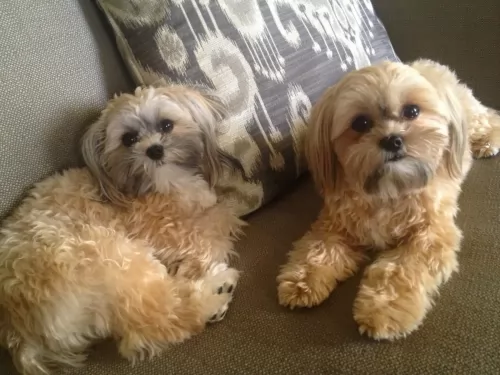 1.Feeding the puppy - The Shorkies need a high-quality, well-balanced dry kibble. Make sure it is a formula for small, active dogs. It should have lean meat and essential minerals and vitamins. Make sure it is puppy food not adult. The puppy needs 300 -550 calories a day in 3 meals.
1.Feeding the puppy - The Shorkies need a high-quality, well-balanced dry kibble. Make sure it is a formula for small, active dogs. It should have lean meat and essential minerals and vitamins. Make sure it is puppy food not adult. The puppy needs 300 -550 calories a day in 3 meals.
2.Feeding the adult – Obesity is a problem for the Shorkie as it is for many small dogs. Don’t overfeed your adult but give her the same kind of high quality small breed dog food, only for adults. They need about 200-300 calories a day in 2 meals.
4. Games and Exercises – These are very active little dogs and need exercise every day. They needs walks, games, and time with you. They also love to cuddle with you at the end of the day. They love squeaky toys and playing fetch outside or inside.